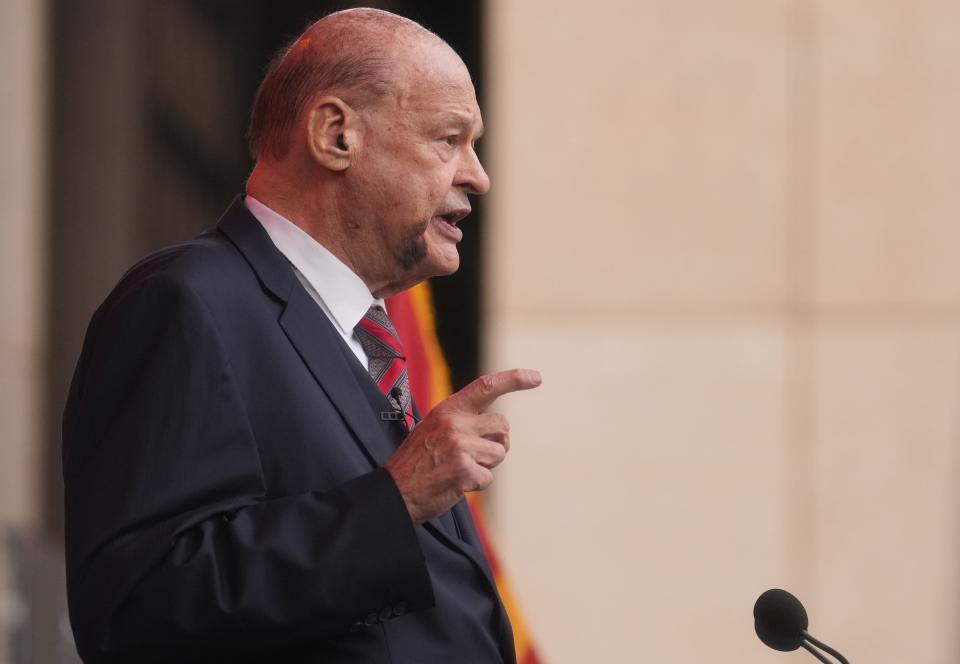Tom Horne taking aim at dual language programs for English learners. How Arizona got here
Superintendent of Public Instruction Tom Horne, a staunch supporter of English-only immersion, is taking aim at the growing number of dual language programs in Arizona.
Horne maintains dual language programs violate Proposition 203 if they include students not yet proficient in English, which they do. Proposition 203 is a ballot initiative passed by voters more than 20 years ago. It requires English learners to be taught only in English. The law essentially banned bilingual education for English learners.
The Legislature in 2019 passed a law that directed the State Board of Education to create more models to give school districts more flexibility to teach English learners.
The Board of Education came up with four models, three of them based on English immersion, and a fourth that allows schools to offer dual language programs that teach students half the school day in English and half in some other language, typically Spanish.
'Watchdogs': Advocates will monitor Tom Horne on English-only education policy

Dual language programs that include English learners are "not consistent with the (Proposition 203) initiative, and the 2019 law did not purport to contradict the initiative," Horne told The Arizona Republic.
Horne is a committed advocate for English immersion and a fierce opponent of bilingual education programs.
Dual language programs will remain in effect for the coming school year, Adela Santa Cruz told English learner educators during a workshop in early May. She is deputy associate superintendent of the Arizona Department of Education's Office of English Language Acquisition Services. But Horne's office has asked the Arizona Attorney General's Office for legal advice to determine whether dual language programs comport with Proposition 203, she said.
What is critical race theory? Is it being taught in Arizona schools?
What is Proposition 203?
Arizona voters passed Proposition 203 in 2000. The ballot initiative requires that English learners — students not proficient in English — be taught only in structured English immersion classes. It effectively bars English learners from participating in bilingual education programs.
"(A)ll children in Arizona public schools shall be taught English by being taught in English and all children shall be placed in English language classrooms," Proposition 203 states.
Prior to Proposition 203, schools in Arizona had flexibility to use a variety of programs to teach English learners, including transitional bilingual education programs and dual language programs, according to University of Arizona education professor Mary Carol Combs, who has studied Proposition 203.
Proposition 203, however, essentially banned English learners from participating in bilingual education or dual language programs. The law allows parents to obtain waivers for children who are 10 or older, have special needs or can pass a test showing they are proficient in English.
Proposition 203, also known as Arizona's English-only immersion law, was bankrolled by Ron Unz, a Silicon Valley software engineer, who also bankrolled similar English-only immersion ballot initiatives that passed in California and Massachusetts. Those two states have since repealed their English-only immersion laws, leaving Arizona as the only state in the nation with a law that requires English learners to be taught only in English. Most other states leave it up to school districts to use a variety of educationally sound programs for teaching English learners.
Proposition 203 was passed the same year a federal judge ruled that Arizona was not adequately funding language acquisition programs for English learners. The ruling was in response to a class action called Flores v. Arizona. The lawsuit was filed on behalf of English learner students against the Nogales Unified School District and is named after one of the students.
Transgender athletes: Arizona AG won't defend Arizona ban on transgender girls in sports
How did legislation passed in 2019 affect Proposition 203?
The Legislature passed Senate Bill 1014 in 2019 after data showed English learners were not learning English under the existing administration of Proposition 203 and were falling behind academically.
It reduced the minimum number of daily hours English learners are required to receive English-only instruction for English language development from four to two. It also opened the door for schools to teach English learners through 50-50 dual language programs.
The pandemic delayed some schools from implementing some of the changes. But now dual language programs are quickly gaining steam. The number of schools with dual language programs increased from 80 in the 2020-21 school year to 110 in the 2021-22 school year, according to Department of Education data.
How do schools identify English learners?
Public schools are required to provide students classified as English learners equal access to programs and services under the 1964 Civil Rights Act and the 1974 Equal Educational Opportunities Act.
However, Arizona's English language acquisition programs historically have been plagued by inadequate funding.
In Arizona, every parent who registers a child for school is required to complete a home language survey asking what language is most spoken at home and by the child and the child's first language. The survey is used to determine if the student should be given a test to assess whether they are proficient in English. That test is called the Arizona English Language Learner Assessment. Schools are required to provide English language acquisition instruction to students who do not pass the proficiency test. The test is also used to determine when the student no longer needs English language acquisition instruction.
How many English learners are there in Arizona?
The number of English learners in Arizona has been increasing in recent years, due to immigration. There are about 93,379 students classified as English learners, according to 2021-22 school year state data, up from 79,631 in the 2017-18 school year. English learners make up about 8.5% of all students in Arizona.
Daniel Gonzalez covers race, equity and opportunity. Reach the reporter at daniel.gonzalez@arizonarepublic.com or 602-444-8312. Follow him on Twitter @azdangonzalez.
This article originally appeared on Arizona Republic: Tom Horne taking aim at dual language programs for English learners

